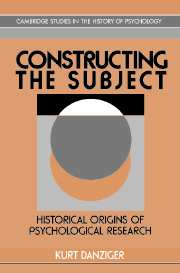Book contents
- Frontmatter
- Contents
- Preface
- 1 Introduction
- 2 Historical roots of the psychological laboratory
- 3 Divergence of investigative practice: The repudiation of Wundt
- 4 The social structure of psychological experimentation
- 5 The triumph of the aggregate
- 6 Identifying the subject in psychological research
- 7 Marketable methods
- 8 Investigative practice as a professional project
- 9 From quantification to methodolatry
- 10 Investigating persons
- 11 The social construction of psychological knowledge
- Appendix
- Notes
- Index
10 - Investigating persons
Published online by Cambridge University Press: 18 September 2009
- Frontmatter
- Contents
- Preface
- 1 Introduction
- 2 Historical roots of the psychological laboratory
- 3 Divergence of investigative practice: The repudiation of Wundt
- 4 The social structure of psychological experimentation
- 5 The triumph of the aggregate
- 6 Identifying the subject in psychological research
- 7 Marketable methods
- 8 Investigative practice as a professional project
- 9 From quantification to methodolatry
- 10 Investigating persons
- 11 The social construction of psychological knowledge
- Appendix
- Notes
- Index
Summary
Extension of the mental test model
American psychologists, as we noted in chapter 7, had set about redefining the psychological problem of individual differences in terms of a comparison of performances against a competitively defined standard. This redefinition appeared to be perfectly adapted to the administrative requirements of social institutions whose efficient functioning depended upon some kind of selection process that was rationally defensible. The kinds of tasks that best lent themselves to the measurement of individual differences in this sense were tasks with answers that were unambiguously right or wrong. Performance on such tasks could be readily arithmetized by counting right and wrong answers, a procedure that had long been conventionalized in the institution of school examinations. Improvements in the precision of such procedures, made possible by Galton's fundamental contributions, eventually led to the construction of normed intelligence tests.
It is hardly a cause for surprise that educational institutions provided the setting in which intelligence tests proved themselves best adapted to administrative requirements. Transferred outside their home ground, their ability to predict future performance was much diminished, often to the point where their practical usefulness vanished altogether. This problem already emerged in the first major attempt at employing intelligence tests in the service of a noneducational institution, the U.S. Army in World War I. Most of the psychologists involved appear to have been convinced of the potential applicability of intelligence tests to military selection problems. However, although they were given considerable leeway and succeeded in testing well over a million men, the army does not seem to have found the results of this exercise particularly useful.
- Type
- Chapter
- Information
- Constructing the SubjectHistorical Origins of Psychological Research, pp. 156 - 178Publisher: Cambridge University PressPrint publication year: 1990



